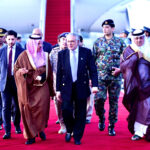VIENNA, Sept 28 (APP): Pakistan on Wednesday urged the
International Atomic Energy Authority (IAEA) to come forward and help Pakistan to effectively deal with the challenges of global warming and climate change.
“IAEA and Pakistan Atomic Energy Commission (PAEC), growing together for the last 60 years, can effectively confront one of the greatest challenges faced by humanity today that is global warming and the associated climate change”, Chairman Pakistan Atomic Energy Commission (PAEC), Muhammad Naeem said.
Addressing the 60th Session of the IAEA General Conference
(GC), being held in Austria from Sept, 26 to Sept, 30 Muhammad Naeem said that Pakistan is one of the ten countries most affected by this change.
“It is for this reason that nuclear power’s contribution in
our energy mix is planned to be increased substantially in future. Nuclear technology also offers means of study and mitigation of climate change. The Agency may aggressively promote the development of relevant nuclear techniques. Technical cooperation programmes in this area should be strengthened,” he added.
“Guided by the past interactions, Pakistan remains committed to collaborate even more with the Agency for harnessing the vast potential of nuclear technology. Nuclear Technology has made significant contribution to the socioeconomic development of the world; this contribution is bound to increase in the coming years.
“The sustainable development goals will require even more
input of nuclear technology. Nuclear Power also has its role in the energy mix of the future; it has to make this contribution in a manner that is safe and beneficial. This is the reason that increasing number of countries are wishing to embark on nuclear power programme.This expansion requires a greater contribution on the part of the Agency as most of the countries wishing to start their nuclear power program look towards IAEA for guidance and support.
“Over the years Pakistan has benefitted immensely from the
expertise made available by the Agency in form of Technical Cooperation Program, Expert Missions; Operational Safety Review Teams(OSARTs) and Assessment of Safety Significant Event Teams(ASSETs) Missions,” PAEC Chief said.
Pakistan’s first Karachi Nuclear Power Plant (KANUPP)
connected to the grid in 1972 continues to function without the vender support and has recently set new record of continuous operation.
The safe and successful operation of KANUPP gave Pakistan the confidence to further pursue and advance the nuclear power option to cope with the country’s severe electric power shortage. Two 325 MWe each, Chashma Nuclear Power Plants, units C 1 and C 2, continue to operate successfully and economically, two more units C 3 and C 4 in this series are expected to be connected to the grid in the coming months, he said.
“Two larger nuclear power plants K 2 and K 3 of 1100 Mwe each are also under construction in Karachi. With the commissioning of these units nuclear power will start to make a sizeable contribution to electricity generation in the country,” he said.
He said Pakistan is firmly committed to keep all its current
and future nuclear power plants, under IAEA safeguards. As the nuclear power generation program is expanding, Pakistan is also investing in safety and security of the nuclear installation.
The new plants being acquired for the Karachi site are
Generation III plants with enhanced safety features.
Muhammad Naeem said Pakistan this year has ratified the
amended Convention on Physical Protection of Nuclear Material and Facilities. Thus fulfilling its commitment made at the Nuclear Security Summit.
“We are grateful to IAEA for arranging Annual Meeting of
International Network for Nuclear Security Training and Support Centres in Pakistan, this was the first time that such a meeting was held at a place other than Vienna. The venue of the meeting was Pakistan’s Centre of Excellence for Nuclear Security (PCENS).
An institute setup to provide specialized training courses in physical protection of nuclear materials and facilities, material control and accounting, personnel reliability, transport security and other security related areas.”
“We are very grateful to the Agency for providing physical
protection equipment to Pakistan Institute of Engineering and Applied Sciences (PIEAS), a premier institute for education and training in nuclear Science and technology in Pakistan.
It also offers special courses on nuclear security and physical protection as part of curriculum on nuclear engineering program.”Pakistan offers these facilities as regional and international hub for training, he added.
Pakistan has always focused on developing a strong safety and regulatory infrastructure. The Pakistan Nuclear Regulatory Authority (PNRA), setup in 2001, enjoys complete autonomy from the operators. PNRA, which has based its regulations on the IAEA safety standards, in collaboration with IAEA is providing its services to embarking countries in development of nuclear safety infrastructure.
Besides nuclear power, Pakistan Atomic Energy Commission has made other important contributions to the socio economic sector by bringing peaceful application of nuclear technology to the common people.
Mentioning PAEC’s contribution in health sector, he said, PAEC is currently providing vital service to the nation through its 18 oncology medical hospitals where about 80% of cancer patients in the country are treated each year. PAEC plans to further expand its services to the public by setting up more nuclear medical centres.
About other areas, he added that our four agriculture and
biotechnology centres are also making valuable contributions to the agriculture and livestock sectors of the country.
PAEC has also developed a very sound infrastructure for addressing various problems related to water resource management using isotopes techniques.
These agricultural research centres have produced 92
varieties of different crops.
Besides, Pakistan Institute of Engineering and Applied Sciences PIEAS, we have a network of in house educational and training institutions that encompass all major nuclear science & technology and nuclear power, such as Karachi Institute of Power Engineering (KINPOE) in Karachi, and Chasnupp Center for Nuclear Training, CHASCENT in Chashma.
Besides meeting the needs of our own programme, these institutes welcome participants from other IAEA member states.
At the end, Muhammad Naeem concluded saying “We aim to play our part at international level as mainstream partner in global non proliferation regimes as a full member of NSG.
Pakistan considers this to be a mutually beneficial proposition for the international community and as well as itself.”
On this occasion, Chairman PAEC paid tributes to Director General, IAEA, Mr. Yukiya Amano, for his leading role in steering the Agency in accordance with its Statute.
“Please accept my appreciation for the positive role IAEA is playing in promoting the peaceful application of nuclear technology around the world”.
“Pakistan has benefitted immensely from this cooperation and we have, on our part, made some contributions towards the Agency’s activities by sharing our experience, providing expert services particularly in the areas of energy planning, water management, nuclear site studies and development of regulatory infrastructure. We hope to be able to contribute even more in future.”




